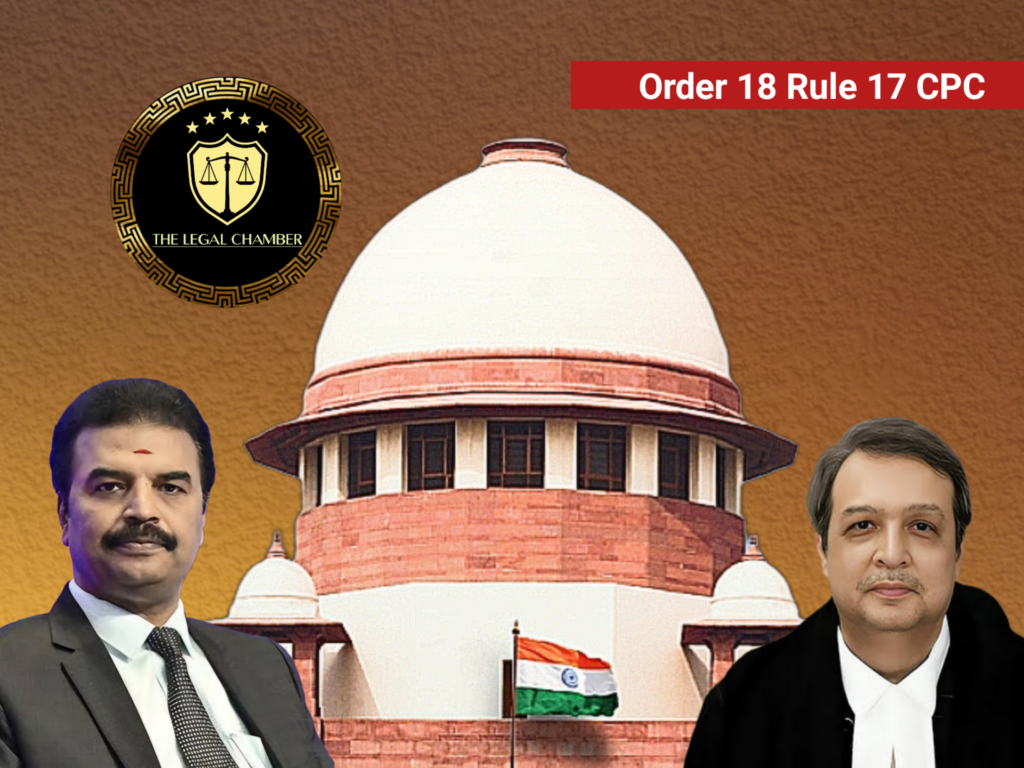
The Supreme Court clarified the scope of Order 18 Rule 17 CPC, emphasizing that the power to recall witnesses rests solely with the court to clarify ambiguities, not to fill lacunae in a party’s case. The ruling reaffirmed that such discretion must be exercised sparingly and cannot be invoked by parties for re-examination or cross-examination. The Court underscored that Section 151 CPC (inherent powers) may permit witness recall in exceptional cases, but routine use is barred to prevent trial delays. The judgment aligns with precedents holding that procedural tools must aid judicial clarity, not protract litigation.
Facts Of The Case:
The case arose from a petition filed by Shubhkaran Singh challenging two orders of the Madhya Pradesh High Court at Jabalpur. The first order, dated 7 January 2025, dismissed his application under Order 18 Rule 17 of the Civil Procedure Code (CPC), which sought the recall of a witness for further examination. The second order, dated 27 February 2025, rejected his review petition against the dismissal. Aggrieved, Singh approached the Supreme Court, arguing that the High Court erred in denying his request to recall the witness.
The core dispute centered on the interpretation of Order 18 Rule 17 CPC, which allows courts to recall witnesses at any stage of a suit to clarify evidence. Singh contended that the provision could be invoked to address gaps in his case. However, the Supreme Court examined the legal scope of the rule, emphasizing that its purpose is limited to judicial clarification—not to enable parties to rectify omissions or strengthen weak evidence. The Court referenced precedents, including Vadiraj Naggappa Vernekar v. Sharadchandra Prabhakar Gogate (2009) and K.K. Velusamy v. N. Palanisamy (2011), to reiterate that witness recall is a discretionary power meant for exceptional cases, not routine litigation tactics. Ultimately, the Court upheld the High Court’s orders, dismissing Singh’s petition and reinforcing strict judicial control over witness recall to prevent misuse and delays.
Read Also: Supreme Court Clarifies Motor Vehicle Act: Insurer Must Pay Compensation Even for Uninsured Trailer
Procedural History:
The case originated when Shubhkaran Singh filed an application under Order 18 Rule 17 of the CPC before the High Court of Madhya Pradesh at Jabalpur, seeking to recall a witness for further examination. The High Court dismissed this application on 7 January 2025 (Miscellaneous Petition No. 7264/2024), holding that the provision could not be used to fill gaps in a party’s case. Singh then filed a Review Petition (No. 117/2025), which was also rejected by the High Court on 27 February 2025.
Aggrieved by these orders, Singh approached the Supreme Court by filing a Special Leave Petition (Nos. 12012-12013/2025) under Article 136 of the Constitution, challenging the High Court’s decisions. The Supreme Court, after examining the scope of Order 18 Rule 17 CPC and its judicial precedents, upheld the High Court’s rulings. It emphasized that the power to recall witnesses is discretionary, court-driven, and limited to clarifying ambiguities—not for allowing parties to re-examine or strengthen their evidence. The Supreme Court dismissed the SLP on 5 May 2025, reinforcing the principle that procedural mechanisms must not be misused to prolong litigation.
Court Observation:
In its judgment, the Supreme Court made several key observations regarding the interpretation and application of Order 18 Rule 17 of the CPC. The Court emphasized that this provision is not a substantive right available to parties but rather a discretionary power vested in the court to clarify evidence when ambiguities arise during trial proceedings. It noted that the rule must be exercised sparingly and only in exceptional circumstances, strictly for the purpose of enabling the court to seek clarifications from witnesses.
The Court categorically stated that Order 18 Rule 17 cannot be used by litigants to fill lacunae in their case or to re-examine witnesses for strengthening weak evidence. It observed that such misuse would lead to unnecessary delays and defeat the legislative intent behind procedural reforms aimed at expediting trials. The judgment also clarified that while Section 151 CPC (inherent powers) may permit witness recall in rare cases, this too must be guided by judicial prudence and not employed as a substitute for proper evidence collection.
Relying on precedents like Vadiraj Naggappa Vernekar (2009) and K.K. Velusamy (2011), the Court reiterated that the primary purpose of witness recall is judicial clarification, not partisan advantage. It warned against the tactical use of such provisions to prolong litigation, stressing that courts must impose strict conditions, including cost penalties, to deter frivolous applications. The observations underscored the judiciary’s role in balancing procedural flexibility with the need for efficient dispute resolution.
Final Decision & Judgement:
The Supreme Court, in its final judgment, dismissed Shubhkaran Singh’s Special Leave Petition, thereby upholding the Madhya Pradesh High Court’s orders dated 7 January 2025 and 27 February 2025. The Court ruled that the petitioner’s attempt to recall witnesses under Order 18 Rule 17 CPC was impermissible, as the provision is designed solely for judicial clarification of ambiguities and not for enabling parties to rectify deficiencies in their evidence.
The bench, comprising Justices J.B. Pardiwala and R. Mahadevan, reinforced that such powers must be exercised cautiously and only when absolutely necessary to serve the interests of justice. The judgment affirmed that Section 151 CPC (inherent powers) could be invoked in exceptional cases but cautioned against its routine use. By dismissing the petition, the Supreme Court sent a clear message against the misuse of procedural mechanisms to delay trials, aligning with its earlier precedents and upholding the sanctity of expeditious litigation. All pending applications, if any, were also disposed of accordingly.
Case Details:
Case Title: Shubhkaran Singh vs. Abhayraj Singh & Ors. Citation: 2025 INSC 628 (Reportable) Appeal Numbers: Special Leave Petition (Civil) Nos. 12012-12013 of 2025 Date of Judgment: 5th May 2025 Bench: Justice J.B. Pardiwala & Justice R. Mahadevan
Download The Judgement Here